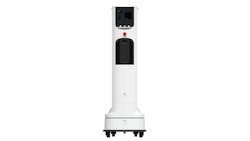Autonomous robot uses ultraviolet light to disinfect high-traffic areas
In this week’s roundup from the Association for Unmanned Vehicle Systems International, which highlights some of the latest news and headlines in unmanned vehicles and robotics, LG Electronics is set to premiere a new robot for automated disinfection tasks and Iris Automation secures funding to expand its machine learning and AI technologies.
LG Electronics developing autonomous robot to disinfect high-touch, high-traffic areas
LG Electronics has announced that it is developing an autonomous robot that will use ultraviolet (UV-C) light to disinfect high-touch, high-traffic areas.
The robot will be officially unveiled at Digital CES 2021 in January. LG Business Solutions USA plans to offer the UV robot to U.S. hospitality, education, corporate, retail, restaurant, and transportation customers in early 2021.
“We hope LG's first UV disseminating robot will give our customers, and in turn their customers, peace of mind,” says Michael Kosla, vice president, LG Business Solutions USA.
“Whether it's hotel guests, students in classrooms or patrons of restaurants and other businesses, they can rest assured that the LG autonomous UV robot will help reduce their exposure to harmful bacteria and germs.”
By helping to disinfect high-touch, high-traffic areas, the robot will enable a “new standard of hygiene,” LG says. Its autonomous design will allow the robot to move easily around tables, chairs and other furniture. It will take just 15 to 30 minutes to irradiate a room’s touchable surfaces, disinfecting multiple areas on a single battery charge.
The robot is engineered to be easy to operate. It can be integrated into established cleaning routines without requiring extensive staff training or specialists to operate it. Using remote updates to smartphones or tablets, staff will be able to monitor the robot's progress.
Employee exposure to UV rays will be minimized through a built-in safety lock activated by human motion detection sensors, pressing of an emergency stop button or via the mobile application.
“A higher level of disinfection is going to become the new customer expectation in the new contactless economy where we now all live, work, learn and play,” Kosla says.
“LG is bringing to bear its expertise in robotics, artificial intelligence and autonomous vehicles for creative solutions like this to meet specific customer requirements.”
LG says that the robot is the first in a series of new LG CLOi autonomous robots planned for introduction in the U.S. during 2021.
Iris Automation to use latest funding to improve Casia DAA system, continue participation in BEYOND program
Iris Automation has closed a successful round of $13 million in Series B venture capital funding.
Known for its Detect-and-Avoid (DAA) system, Casia, Iris Automation will use this latest investment for several initiatives, including to expand machine learning and AI capabilities and testing to improve and extend the Casia system’s performance envelope; to continue to improve detection and classification capabilities of the Casia system to support expanded use cases, operational environments and aircraft compatibility; and to build out fulfillment capabilities to produce, deliver and support the growing installed base of aircraft OEM partners and end use customers, and enter new markets associated with aircraft safety.
The computer vision technology company will also use the funding to continue to participate in the FAA’s BEYOND program, which is focused on enabling beyond visual line of sight (BVLOS) UAS operations to advance airspace integration. BEYOND will demonstrate operations that are “repeatable, scalable and economically viable,” with specific emphasis on infrastructure inspection, public safety operations and small package delivery.
“We are incredibly excited about this show of support from our current and new investors, particularly during this unprecedented global pandemic,” says Jon Damush, CEO of Iris Automation.
“We have always known that our approach to the problem solves a critical missing link for unpiloted systems, and plan to deploy this capital to further expand our capabilities and improve safety for unpiloted systems as global regulators work to integrate UAS into existing airspaces. The investment clearly illustrates investor confidence in growth of the sector and specifically Iris’ role in the ecosystem.”
Share your vision-related news by contacting Dennis Scimeca, Associate Editor, Vision Systems Design
SUBSCRIBE TO OUR NEWSLETTERS
